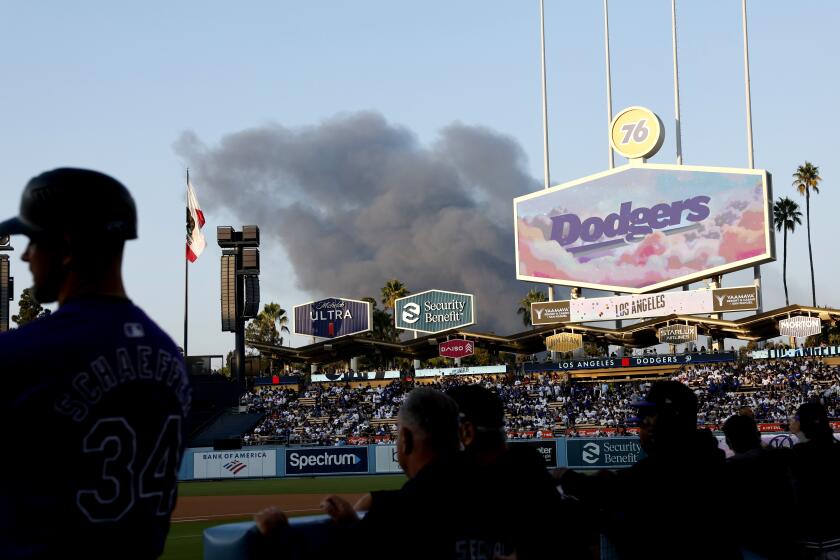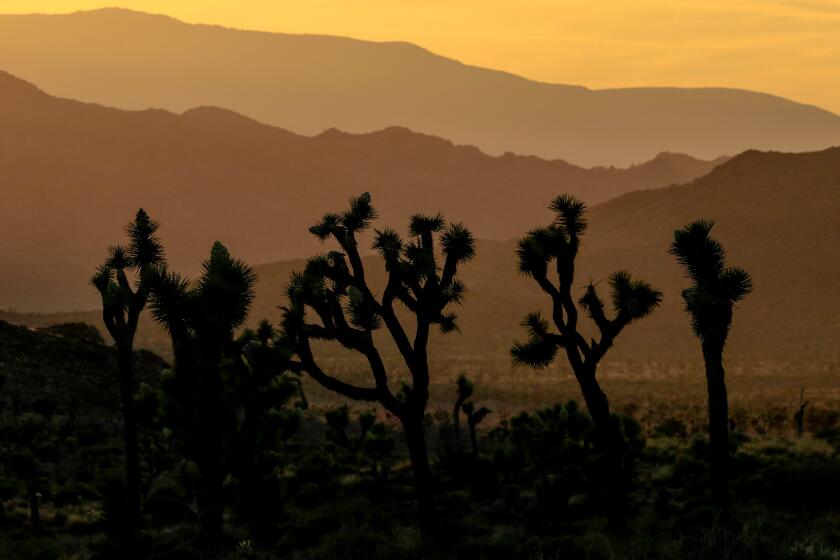Oil Left at Resort Site Sparks Fear
Wedged between the curving lawns of a resort hotel and a shopping promenade at the municipal pier, a vacant 31-acre parcel defines Huntington Beach’s past and future.
The mostly barren dirt, surrounded by a mesh-covered chain-link fence, represents what was, decades ago, the pulsing fortunes of Chevron USA.
When the Beach Boys sang of surfin’ safaris and good vibrations, ubiquitous pumps teeter-tottered along this coastal stretch, sucking crude oil from the ground and spewing the pungent odor of oil into the briny air.
Today, the beachfront is lined with Mediterranean-style hotels bearing the brand names of Hyatt and Hilton. Boutiques and coffeehouses abound.
Conspicuous in its emptiness, the parcel along Coast Highway is a keystone in the city’s quest to remake itself into a resort vacation destination.
But residents of an aging trailer park adjacent to the rear of the project site want assurances that nothing remains of the spilled oil before the parcel is developed into a boutique hotel, condominiums, shops and entertainment venues.
An important preliminary step, they say, is for independent testing to measure and characterize the extent of the oil pollution. The residents want testing done before the Huntington Beach Planning Commission discusses the environmental impact of the project, known as Pacific City, in late February or early March.
“We like the development, and no one wants to stop it, but we want to make sure the soil’s cleaned up,” said mobile home owner John Sisker.
He and his neighbors say their anxieties are well placed. Friends who have moved into new homes built atop oil fields have become sick, they say.
There is no mention in the city’s environmental report of a link, as some residents suspect, between oilfield redevelopment and brain tumors that have killed four children in a two-mile radius within the city since February 2000.
In 2001 and again last year, county health officials discounted any connection between the tumors and where the children lived, saying the incidence was no greater than in the general population.
Still, the residents’ coalition said the county has an obligation to monitor projects on former oil land, which once comprised three-quarters of the city.
They have been assisted by Steve Kawashima, an official with the Hotel Employees and Restaurant Employees International Union in Los Angeles, which investigates development projects where hotels are planned.
“We don’t want any more children getting sick,” said Cheri-Jan Olson, a coalition member whose husband hauls dirt from other Chevron oilfields in town. Their 5-year-old son, Trent, died in June from a rare brain stem tumor that some studies say may be linked to petrochemical exposure.
The site will be safe to the satisfaction of city and state regulators before construction begins, said Huntington Beach principal planner Mary Beth Broeren, who has overseen the redevelopment of about 400 acres of former Chevron oil fields in the city since 1996.
Further assurances come from the developer, which wants the site cleaned for its own purposes. For landowner Makar Properties of Newport Beach, Pacific City represents the piece de resistance of Huntington’s coastal gentrification.
The project gets its name from Seal Beach developer Philip Stanton, who, in 1901, dubbed Huntington Beach “Pacific City” as the West Coast’s answer to Atlantic City.
Anchored by a 400-room boutique hotel, Makar’s Pacific City will include a sweeping esplanade with 240,000 square feet of commercial and entertainment uses expected to draw people staying at the nearby Hilton and Hyatt resorts. Behind the shopping plaza, 516 condominiums will be clustered in three villages.
Construction is expected to take five to seven years, beginning with the shopping plaza and hotel. The project is expected to create 600 jobs.
“There just aren’t any places like this left on the coast,” said Michael Gagnet, Makar’s senior vice president, who managed construction of the company’s St. Regis Monarch Beach Resort and Spa in Dana Point.
Chevron is responsible for the cleanup. Soil in the southern third of the site has been cleaned and more tests are scheduled on the northern portion next month, Gagnet said. Final cleanup is expected in six to nine months, and will be monitored by the Huntington Beach Fire Department.
“As the developer, we have considerable investment in the property already, and we’ll have a tremendous investment upon completion,” he said.
“We’re going to ensure the site is cleaned.”
More to Read
Sign up for Essential California
The most important California stories and recommendations in your inbox every morning.
You may occasionally receive promotional content from the Los Angeles Times.










